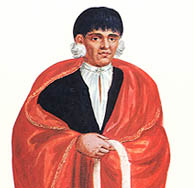

King Hendrick (Tiyanoga), Mohawk Chief
Written and researched by Margaret Odrowaz-Sypniewska, B.F.A.

Hendrick (Tiyanoga) was a Mohawk chief (1680-1755), and a close political ally of William Johnson and the English. His father was a Mohegan and his mother was a Mohawk. He once met Queen Anne in England, and therefore was dubbed "King Hendrick." He frequently joined English attacks against the French, and openly criticized British army stategy. He was killed at the Battle of Lake George in 1755. By August 24, 1711, many Iroquois were angry at the French, who they believed were responsible for western attacks on the Iroquois people. Hendrick and his fellow Mohawk ambassadors, after their return from London told of England's vast resources and power. England had just won a battle at Port Royal and English gifts and promises of aid, made many Iroquois take their side, in battle, against the French. However, only two-thirds fought (the rest remained neutral). The Treaty of Utrecht ended the war in 1713. This Peace lasted until 1744. King George's War came and again the Iroquois wanted neutrality, saying they and the Cacknawega Indians in Canada would not make war upon each other. They could not make peace with the facility white people did. The Mohawks, under the influence of William Johnson, were the only branch willing to aid New Yorkers. However, the chain of events angered Henrick. On June 1753, Chief Hendrick and sixteen of his Mohawk men, travelled to New York City and demanded an audience with Governor Clinton. Hendrick reminded the governor that the Iroquois had fought with the English many times. However, if they didn't stop ignoring Iroquois rights, The Covenant Chain would be broken. Mohawk land had been taken fraudulently by the New York Colonists. Clinton's evasive reply angered them. They left the meeting. William Johnson met with them and convinced them to return to help the English. Finally the Iroquois renewed the Covenent Chain. Iroquois demands were satified (at least for the moment). The British decided that the Treaty of Utrecht made the Iroquois British subjects, therefore all Iroquois lands belonged to the English Crown. They especially wanted rights to the Iroquois' Ohio lands. Chief Hendrick made it clear to the British that Iroquois loyality had a price and should the British again ignore Iroquois needs, they would cast their votes with the French.
In 1755, Henrick joined the British against the French, which resulted in King Hendrick's death at the hands of the French near Lake George. A thirteen (13) year old Mohawk, named Joseph Brant, also fought in this battle.
The Iroquois hated being cheated. Violence erupted when traders tried to cheat them. The New York governors understood this totally and tried to guard against such behavior on the part of the whites. On December 21, 1730, Governor Crosby (of New York) spoke out against traders cheating the Indians. However, it was easy to see that his promises were as good as the watered down rum they tried to sell to the North American Indians. The Iroquois were against alcohol, because it robbed their people's brain and was ruining their lives. Many Iroquois wanted the rum trade to stop.
RELATED LINKS:
THE ENGLISH had the following advantages over the French:
This page was last updated on January 8, 2005
